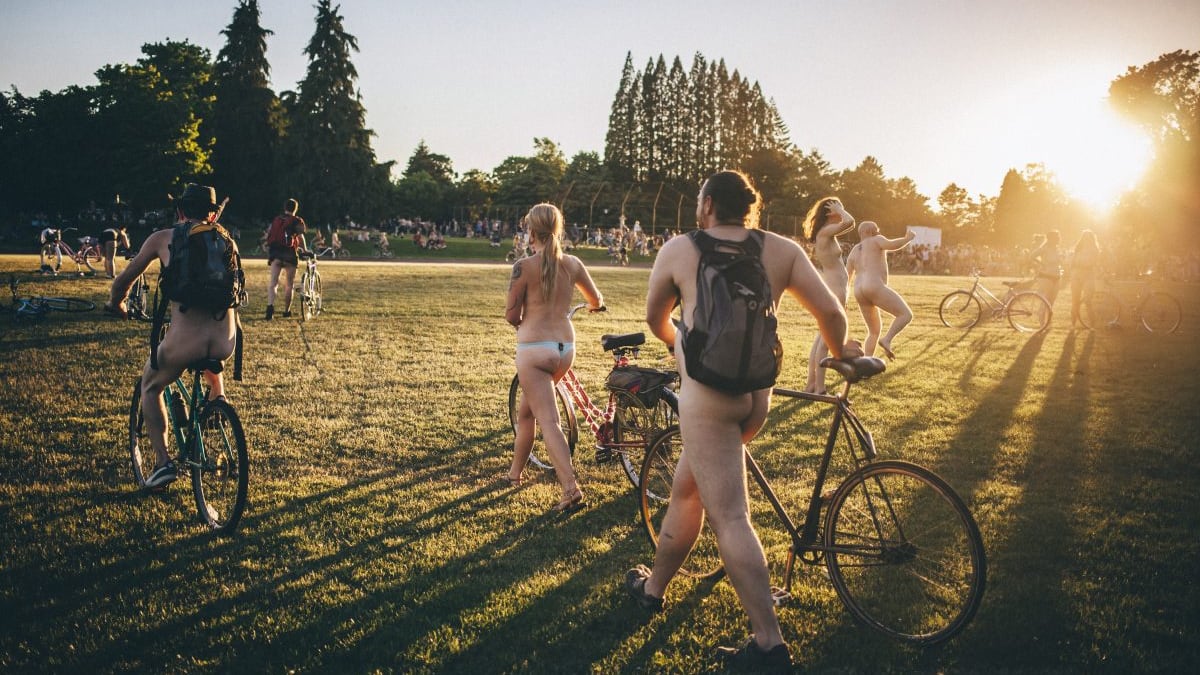After 20 years, Portland’s famed annual naked bike ride is taking a pause.
“The ride isn’t canceled—it’s cocooning right now,” says Meghan Sinnott, one of the ride’s veteran organizers. “It’s been a long time coming.”
The hiatus was announced Wednesday, and previously reported by such outlets as BikePortland.
The annual ride is run by Portland World Naked Bike Ride, a nonprofit overseen by a team of volunteers, like Sinnott, that ebbs and flows each year. “The World Naked Bike Ride was, is and will always be a ragtag team of varied individuals,” Sinnott says. “We’ve had multiple BIPOC organizers, queer organizers, female organizers; our lead volunteer coordinator for years wasn’t able to ride a bike physically—it’s always been a diverse mix of people with a passion for the protest,” Sinnott says.
The group kicked off in 2004 as a protest of pollutive modes of transportation, officially branding itself as the PWNBR in 2005. Less than a decade later, there were nearly 10,000 people gathering annually to ride together in the buff.
For many, it’s a tradition. For the organizers, it’s a dedicated effort—including an immense amount of unpaid work and organization. Lead cyclists and wranglers help navigate the ride, along with logistical organizers, route planners, social media managers. To make the ride happen takes a village.
“It’s a lot of work,” Sinnott says. “Anybody can lead a ride—over 600 people lead bike rides every summer. The World Naked Bike Ride is different. It brings in different riders, more novice cyclists, people who are unfamiliar with the city, vulnerable road users.”
Though there are hundreds involved in PWNBR, the leadership team has continued to change. For years, Sinnott and other longtime volunteers have been looking to bring in new helping hands.
“For the last decade, we’ve been trying to pass the baton to new wranglers with varied success—training and having them move away, training others and having them decide it’s too much work for free,” Sinnott says. “We’ve had other organizers take on the lead wrangler role and realize it’s too much responsibility, that they don’t feel comfortable from a safety point, or from a personal sanity point.”
This effort has started to come together as new volunteers have come into the fold. But with that change has also come hiccups in organization. Last year’s 2023 ride came together on a much quicker timeline, some said too quick. When it came to this year, the hope was to have the ride in late summer, but no set date was ever officially announced. As things were again moving on a condensed timeline, concerns were raised.
“Nobody wants to point fingers, nobody wants to name names. I think there had been enough people in their own way saying they weren’t comfortable with the ride this year that they spoke out,” Sinnott says.
After some conversation, a decision was made to pause this year’s ride and use this time to generate more interest in building a bigger volunteer team and keeping safety at the forefront.
“This sort of responsibility should be spread throughout a large group of volunteers rather than falling on 10 key people,” says Pamela Hines, a newer 2023 PWNBR volunteer leader.
Anyone interested in volunteering, whether a cyclist or not, is encouraged to apply. Hines and Sinnott will be working through applications. As Sinnott and Hines both note, the goal is to bring in a wider network of new supporters to create an even stronger, safer ride.
“We want to maintain that good standing in the community, rather than being haphazard,” Hines says. “The city deserves to have that expertise.”
“At some point, it’s a healthy thing to take a step back and say, ‘What’s the best way for this event to move forward for the entire community?’” Sinnott says. “Not the lead organizers, not people who go on the ride, people who are pissed in their cars, Parks and Rec—the entire community. What can we do to show that we actually care about safety, inclusivity, transparency in organizing, and diversifying who is actually leading?”

